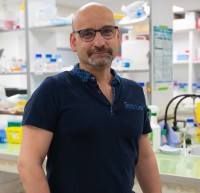Health
Pandemics & Infectious Diseases
Prevention & Personalised Health
Antimicrobials, Antibiotics & Drug Resistances
Microbiome
Bacteria & Other Microorganisms
Ph.D
France
2011.09.30
Impact of fluoroquinolones on human commensal flora: dynamics of bacterial resistance and changes of the intestinal microbiota
Antibiotic resistance is a major issue that is challenging medicine in unprecedented ways. Some previously easily treated diseases, such as gonorrhea, now represent major health threats because of new, multi-resistant strains. The forward-looking approach taken by Victoire de Lastours befits the magnitude of the issue. Instead of examining isolated pathogens by themselves, she is focusing on the too-often disregarded commensal bacteria – the mostly harmless germs that are present throughout our lives.
As you may have heard, the human body is made up of about 50 trillion (50 million million) human cells… and 10 times more bacteria. They help in various bodily functions – such as digestion – and provide protection against pathogenic bacteria which may seek to invade the niches occupied by our “housemates.” However, these friendly bacteria may only be fair-weather friends. Indeed, Victoire de Lastours is currently investigating whether they distribute resistance genes to some of our worst enemies. The gastrointestinal tract could be the ideal stage for this betrayal. Home to the highest number of commensal bacteria in the body and extremely exposed to antibiotics, it hosts the famous Escherichia coli (E. coli) bacterium – both a commensal and a pathogen frequently responsible for sometimes severe intra- and extraintestinal infections.
The young medical student has already shown that these bacteria become resistant to fluoroquinolones, one of the largest families of broad-spectrum antibiotics. The resistance genes acquired can be passed on to pathogens, thus accelerating the emergence of resistance to antibiotics. This phenomenon is most likely more prevalent than the direct selection of resistant bacteria at the site of infection. In addition to the gastrointestinal tract, Victoire de Lastours’s work will explore these mechanisms in the normal skin and nasal flora. Only with such an in-depth understanding will it be possible to effectively cope with antibiotic resistance.
Resistance to antibiotics is the result of direct selection at the site of infection but also, and probably predominantly, in the commensal flora. The specific approach of our group is to study factors involved in the emergence of antibiotic resistance in commensal flora. We focus on fluoroquinolones which are the most prescribed antibiotics in the world, but increasing resistance rates are threatening their efficiency. Moreover, because they diffuse particularly well in the ecosystems, they have an important effect on the microbiota.
As you may have heard, the human body is made up of about 50 trillion (50 million million) human cells… and 10 times more bacteria. They help in various bodily functions – such as digestion – and provide protection against pathogenic bacteria which may seek to invade the niches occupied by our “housemates.” However, these friendly bacteria may only be fair-weather friends. Indeed, Victoire de Lastours is currently investigating whether they distribute resistance genes to some of our worst enemies. The gastrointestinal tract could be the ideal stage for this betrayal. Home to the highest number of commensal bacteria in the body and extremely exposed to antibiotics, it hosts the famous Escherichia coli (E. coli) bacterium – both a commensal and a pathogen frequently responsible for sometimes severe intra- and extraintestinal infections.
The young medical student has already shown that these bacteria become resistant to fluoroquinolones, one of the largest families of broad-spectrum antibiotics. The resistance genes acquired can be passed on to pathogens, thus accelerating the emergence of resistance to antibiotics. This phenomenon is most likely more prevalent than the direct selection of resistant bacteria at the site of infection. In addition to the gastrointestinal tract, Victoire de Lastours’s work will explore these mechanisms in the normal skin and nasal flora. Only with such an in-depth understanding will it be possible to effectively cope with antibiotic resistance.
Resistance to antibiotics is the result of direct selection at the site of infection but also, and probably predominantly, in the commensal flora. The specific approach of our group is to study factors involved in the emergence of antibiotic resistance in commensal flora. We focus on fluoroquinolones which are the most prescribed antibiotics in the world, but increasing resistance rates are threatening their efficiency. Moreover, because they diffuse particularly well in the ecosystems, they have an important effect on the microbiota.
Backstabbing Germs
To add or modify information on this page, please contact us at the following address: community.research@axa.com

Victoire
DE LASTOURS
Institution
Université Paris Diderot
Paris VII
Country
France
Nationality
French
Related articles
Health
Mental Health & Neurology
Prevention & Personalised Health
Alzheimer's Disease, Dementia & Neurodegenerative Diseases
Genetics & Omics
Mécénat des Mutuelle
France
Characterization of the Genetics of Alzheimer's Disease
This project, led by Jean-Charles Lambert, is going to sequence the whole genome of 10,000 patients with Alzheimer's disease in... Read more

Jean-Charles
LAMBERT
.thumbnail.jpg)
